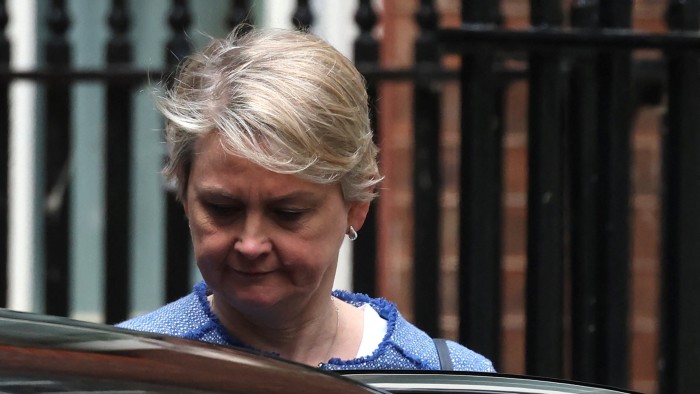This article is an on-site version of our Inside Politics newsletter. Subscribers can sign up here to get the newsletter delivered every weekday. If you’re not a subscriber, you can still receive the newsletter free for 30 days
Good morning. The government’s biggest public policy success is agreeing a trade deal with India — yes, these things are comparatively small beer compared with, say, being back inside our nearby trading bloc or having better terms with it, but easing barriers to trade is a Good Thing.
So too is a looming US-UK trade agreement of some kind (even though it will probably be small and the unreliable behaviour of the other negotiating party, Donald Trump’s White House, means it provides less certainty than is desirable).
One problem with the UK’s post-Brexit politics is that we have essentially two tendencies when it comes to trade: one that sniffs at anything involving any form of reduced barriers to trade and movement, and one that sniffs at anything that isn’t getting us closer to the EU.
A question some of you have asked is, given that one of these measures is intended to increase the number of Indians coming to the UK to work as intra-company transfer workers, what does this tell us about the broader direction of government policy and the influence of the Home Office? Some more on that below.
Inside Politics is edited by Georgina Quach. Follow Stephen on Bluesky and X, and Georgina on Bluesky. Read the previous edition of the newsletter here. Please send gossip, thoughts and feedback to insidepolitics@ft.com
Go figure
Who is the most influential and important minister when it comes to the government’s programme at the moment? Answer: Yvette Cooper, the home secretary. It’s Cooper and the Home Office who are winning the internal battle with the Department for Education over the reform of graduate visas for foreign graduates from UK universities. It is Cooper’s objections to a youth mobility scheme that have to be satisfied if the UK is to successfully reduce barriers between London and Brussels (on which the EU and UK are deeply split as it stands, according to this FT exclusive).
I’ve previously written about Cooper’s influence and Patrick Maguire had a smart column on it in the Times recently. Patrick writes:
[Yvette Cooper is] unwilling to allow something that looks and quacks like the free movement of young people — which others in government increasingly see as a fair price for a closer economic partnership — without something meaningful in return. If the EU is to get open borders for twentysomethings, then the Home Office thinks it could do with access to the biometric data Brussels holds on asylum seekers, irregular migrants and criminal suspects at a minimum.
It is, departmental sources admit, a hardball gambit. The glide path to [this month’s] UK-EU summit may encounter turbulence as a result. There are also those elsewhere in Whitehall who question whether Cooper’s single-minded drive to lower net migration numbers will end up sacrificing the benefits of growth on the altar of symbolism.
Yet here we are today, and the British government has signed a trade deal with India that reduces tariffs between the two countries and contains within it a tax waiver (one that is common in trade deals) the benefit of which is to encourage the temporary movement of people to work in the two countries. (Exhaustive rundown of what is in the deal by my colleagues here, while premium subscribers can register for the India Business Briefing newsletter for analysis of Indian business and policy.)
Is this a sign that at the top of government, the rhetorical commitment to free trade and growth is winning out over the rhetorical commitment to reducing immigration? I’m afraid not: ultimately the measures in this trade deal don’t commit the UK to issuing more intra-company transfer visas: it makes it more likely that these visas will continue to be issued in large numbers for Indian workers, that’s all. But as a sign of the direction of travel and the balance of forces within the government, plans to limit permanent residency for some migrants are a better gauge on where the government stands.
Now try this
I’ve been eating a lot of crab lately, because Herd, alongside their wide range of fish, now offer spider crabmeat, which allows you to feel the warm glow of helping to eat away at an invasive species and enjoy delicious crabmeat at the same time. I’m thinking of giving this Rowley Leigh recipe a go, but let me know your preferred crab recipes by emailing me.
Top stories today
-
Tacking rightward | The Conservatives published a “deportation bill” on Tuesday night that would entail the automatic deportation of anyone who arrives in the UK through an illegal route, such as crossing the Channel on a small boat. It comes after Kemi Badenoch branded last week’s local election results a “bloodbath”.
-
Speaking of Badenoch . . . | The Tory leader has been accused by Indian officials of talking “rubbish” after she denounced the “two-tier” tax arrangement at the heart of the UK/India trade deal negotiated by Keir Starmer.
-
Indefinite leave | Migrants in the UK would need to wait longer before they could apply to make their residency permanent under plans being drawn up by the government as part of a crackdown on people coming to work in Britain.
-
Pentagon plea | The US wants the UK military to focus more on Europe and less on Asia, in a big policy shift from the Biden administration, which pushed European allies to boost activity in the Indo-Pacific to send a strong signal to China.




